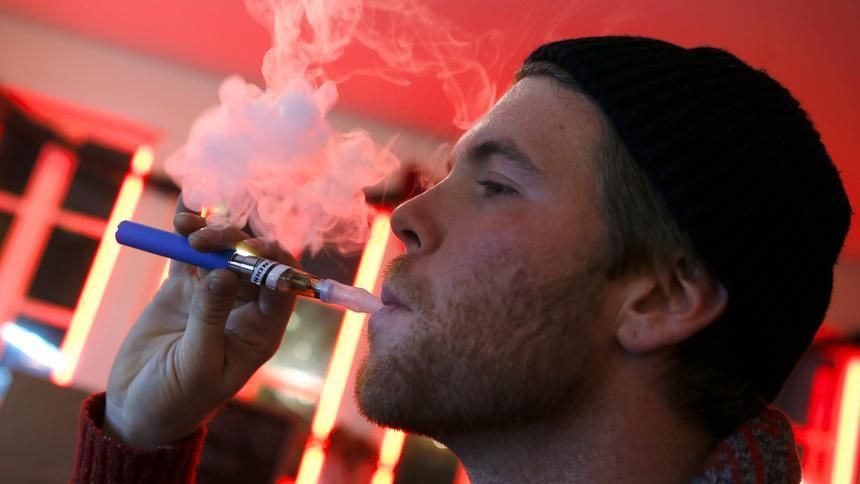House rejects tobacco tax hike, approves bills banning e-cigarettes to minors.
BISMARCK – House lawmakers on Friday rejected a tobacco tax hike and approved a bill that bans the use of e-cigarettes by minors while also defining them as a non-tobacco product, which one Democrat criticized as a “stealth” way to prevent them from being taxed in the future.
After a long and winding debate, representatives voted 34-56 to defeat House Bill 1421, which would have increased the excise tax on a pack of cigarettes from 44 cents to $1.54, with comparable increases on snuff and chewing tobacco.
Health and medical organizations backed the increase, while business groups and border retailers fought it.
Rep. Vicki Steiner, R-Dickinson, a member of the House Finance and Taxation Committee that gave the bill a 12-2 do-not-pass recommendation, said tobacco is a legal product and raising the tax by 285 percent would hurt smokers unable to quit, including low-income residents.
“Why would we increase a tax on our people simply because they have an addiction?” she said. “Let’s light up the board with red votes.”
Rep. Jon Nelson, R-Rugby, lead sponsor of the bipartisan bill, said it’s “undeniable” that higher tobacco taxes reduce smoking rates, especially among youths – a claim challenged by bill opponents – and that the bill puts responsibility on smokers who drive up health care costs.
He and other supporters highlighted that the 44-cent tax hasn’t been raised since 1993 and is the 46th lowest in the nation. The $1.10 increase would have put the tax on par with the national average but still below the regional average. South Dakota’s tax is $1.53 per pack, while Montana’s is $1.70 and Minnesota’s is $2.90.
“Does that make sense in this day and age, that we need a 44-cent tax to bring people to this state?” Nelson said, adding, “This is all about health, and it’s about stopping smoking.”
Rep. Rick Becker, R-Bismarck, said the bill was well-intentioned but shortsighted.
“It is not our job to raise taxes to try and mold people’s behavior to what we think is a better and more healthy lifestyle,” he said.
A companion bill, Senate Bill 2322, would raise the cigarette tax to $2 per pack.
Predicting a possible statewide vote on the issue, Nelson warned that if the Legislature doesn’t act to increase tobacco taxes, “the people of North Dakota will, and I hope you like what they come up with.”
Tobacco taxes also were a central part of the debate over three bills that aimed to restrict minors from using or buying e-cigarettes.
The first bill to pass, HB1186, would make it an infraction to sell or give anyone under 18 an electronic smoking device or alternative nicotine product, or for minors to buy, possess or use them. Unlike the other two bills, it wouldn’t classify e-cigarettes as a tobacco product.
The bill’s lead sponsor, Rep. Kim Koppelman, R-West Fargo, said that while e-cigarettes use nicotine extracted from tobacco, they’re not tobacco products. He said the other bills’ attempts to try to define them as such were “a back-door way” to taxing e-cigarettes.
“This bill is not about taxation. It’s not about regulation,” he said, adding e-cigarette use by youths is an “epidemic” that lawmakers need to address.
But opponents of Koppelman’s bill argued that the two issues can’t be separated.
“The issue is this bill has a definition which preempts these devices as being considered tobacco products,” said Rep. Eliot Glassheim, D-Grand Forks. “It’s a new definition, and it seems to me it’s a stealth way of not being able to tax them in later bills.”
Rep. Kris Wallman, D-Fargo, worried that the bill sends the message to kids that e-cigarettes aren’t as bad as regular cigarettes.
“It tastes like Skittles, but it’s a cigarette,” she said.
Lawmakers voted 71-20 to send the bill to the Senate, then killed the bill supported by anti-tobacco groups, HB1265, on a 37-54 vote.
The third bill, HB1078, passed 51-40.Introduced by Rep. Diane Larson, R-Bismarck, it makes it illegal for minors to use or be sold “nicotine devices.”
The bill defines nicotine devices as “any noncombustible product that can be used by an individual to simulate smoking through inhalation of a substance that contains or delivers nicotine or any other ingredient.”


 68 Απαντήσεις
68 Απαντήσεις 7028 Εμφανίσεις
7028 Εμφανίσεις
